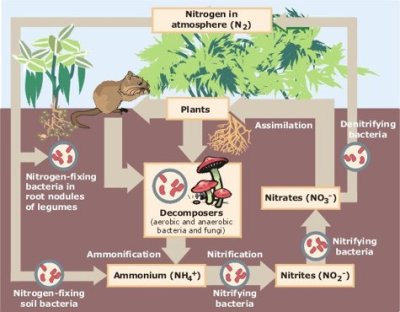
Chemistry of the fungi to bacteria ratio
 Why
do some plants like fungi around their roots while others like
bacteria? The answer takes us into the realm of chemistry...hang
in there.
Why
do some plants like fungi around their roots while others like
bacteria? The answer takes us into the realm of chemistry...hang
in there.
Most soil bacteria
secrete a slime that holds them to soil particles so
that the tiny microorganisms don't wash away. This slime tends to
be alkaline, so as bacteria build up, the soil pH rises above 7.
Meanwhile, the type of
nitrogen in the soil changes. Decomposers
in the soil excrete ammonium as a waste product, but when there are
lots of bacteria around, the bacteria convert the ammonium into nitrate.
On the other hand, soil
fungi secrete acids that they use to break down
organic matter, making it easier to digest. The acids in the soil
make the environment more difficult for bacteria to inhabit, so most of
the nitrogen in the soil stays as ammonium rather than being converted
to nitrate.
As every gardener knows,
plants care about pH. What many
gardeners don't realize is that plants also care about the form of
nitrogen they take up. Vegetables, annuals, and grasses tend to
prefer nitrate, while trees, shrubs, and perennials prefer
ammonium. Now we know why lettuce is going to throw a hissy fit
if the soil is full of fungi.
| This post is part of our Teaming With Microbes lunchtime series.
Read all of the entries: |
Want more in-depth information? Browse through our books.
Or explore more posts by date or by subject.
About us: Anna Hess and Mark Hamilton spent over a decade living self-sufficiently in the mountains of Virginia before moving north to start over from scratch in the foothills of Ohio. They've experimented with permaculture, no-till gardening, trailersteading, home-based microbusinesses and much more, writing about their adventures in both blogs and books.
Want to be notified when new comments are posted on this page? Click on the RSS button after you add a comment to subscribe to the comment feed, or simply check the box beside "email replies to me" while writing your comment.
